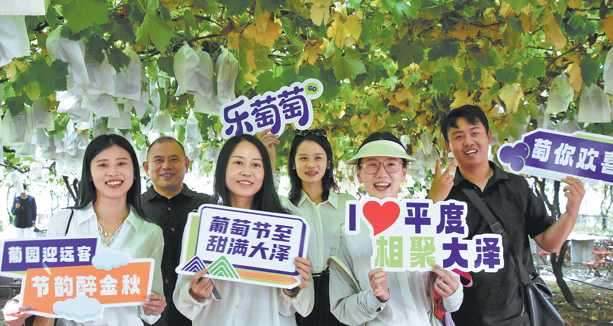Shandong manufacturing center stimulates regional development


As key projects advance and major industrial events unfold, Pingdu, Shandong province's largest county-level city, is drawing unprecedented attention and emerging as a prime investment destination.
Strategically positioned at the geometric center of Qingdao, Yantai, and Weifang, Pingdu serves as a pivotal hub for regional collaboration. It faces Japan and South Korea to the east, connects with the Beijing-Tianjin-Hebei region in the north, and to the south, borders the China-SCO Local Economic and Trade Cooperation Demonstration Area, which is designed to promote cooperation among member countries of the Shanghai Cooperation Organization.
Boasting six highways, Pingdu ranks as China's county-level city with the longest highway mileage. The opening of the Weifang-Laixi and Weifang-Yantai high-speed railways has further woven it into a seamless transport network, offering travel times of 40 minutes to Qingdao, one hour to Jinan, and three hours to Beijing.
Air connectivity is equally strong. Pingdu lies just 40 minutes by car from Qingdao Jiaodong International Airport, with its southern town of Nancun only 12 kilometers away — a gateway to global markets via the airport hub.
In addition, its proximity to major ports in Qingdao, Yantai and Weifang, coupled with the development of Xinhe International Land Port, positions Pingdu as a critical multimodal transport hub on the Jiaodong Peninsula, offering streamlined logistics and a vast industrial hinterland.
A robust industrial base drives Pingdu's growth. Covering 32 of China's 41 national industrial categories, the city hosts nearly 40,000 enterprises from 33 countries and regions, forming a comprehensive and resilient industrial ecosystem.
It has cultivated and attracted leading industries, including smart home appliances represented by Hisense, high-end equipment led by China Iron & Steel Research Institute Group, food and beverages exemplified by Tsingtao Brewery, and high-end chemicals spearheaded by Haiwan Group.
Pingdu is also upgrading its specialty sectors, which hold significant global and national market shares. These include the eyelash industry, which accounts for 70 percent of global production; the high-end savory seasoning industry, occupying 70 percent of the domestic market; and straw weaving handicrafts with an annual output value of 7 billion yuan ($982.6 million) — all underscoring the city's market competitiveness and unique appeal.
The rapid implementation of projects reflects Pingdu's thriving business environment. A case in point is Huinuo Changyuan Heavy Industry Technology's high-end equipment manufacturing project — a key Qingdao initiative with a total investment of 1.2 billion yuan and covering 6.67 hectares.
"The timeline from land acquisition to construction kickoff was shortened by nearly two months, with multiple approvals processed simultaneously," said Du Tongyu, a project leader.
"During construction, issues such as road access, water, electricity, and telecom signals were resolved promptly. Pingdu's precise, end-to-end service has truly impressed us," Du added, echoing the sentiment of many investors.
By deepening reforms in construction project approvals, Pingdu has integrated previously fragmented tasks — including planning verification, fire safety acceptance, archive acceptance, and completion filing — across departments.
Through parallel approvals and notification commitments, it has cut project acceptance times by an average of 17 days, with industrial projects achieving joint acceptance in as little as three days.
Efficient government services have translated directly into growth. From January to August this year, Pingdu recorded 343 new fixed-asset investment projects, a 37 percent year-on-year increase. Of these, 152 projects each involve planned investments of 50 million yuan or more, with 134 exceeding 100 million yuan.
Looking ahead, Pingdu has mapped out a clear innovation-driven industrial strategy, aiming to achieve major breakthroughs in four emerging industries: the low-altitude economy, new energy and materials, cultural tourism and wellness, and new consumption.
The city is also enhancing and upgrading five existing key industries — including smart home appliances, high-end chemicals, and modern agriculture — while refining its distinctive fashion-related sectors such as beauty and weaving arts.
haonan@chinadaily.com.cn




































